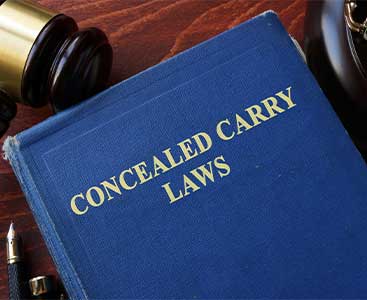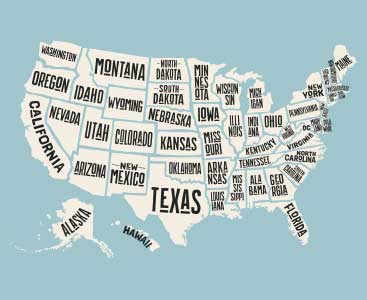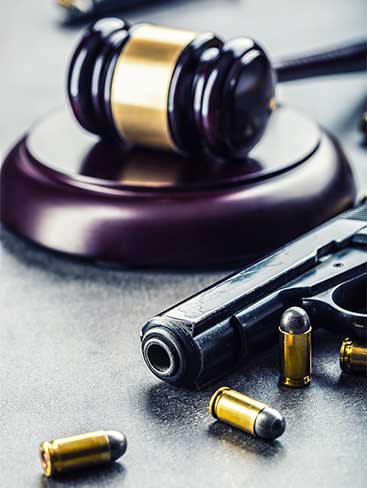Guest Post: Concealed Carry: Different Laws in Different States
Concealed carry refers to possession of a firearm within you, on you, or around you while in public space. Concealed carry and firearm ownership in general is common in the United States. Recent studies indicate that 37% of American households own at least one firearm, with millions of Americans admitting to carrying concealed weapons in public to protect against violent crimes.

Allowing people to carry weapons in the streets may increase the risk of deadly altercations among strangers, especially when drugs and alcohol abuse is involved. To prevent guns from falling into the wrong hands, most U.S. states have gun possession laws that require individuals to meet certain requirements to legally obtain firearms.
These laws vary by state, as each locale strives to find the best way to balance safety concerns with the Second Amendment’s right to keep and bear arms.
Concealed Carry Laws in Different States
Every U.S. state and the District of Columbia allow people to carry concealed weapons:
- 35 states require individuals to obtain carry concealed weapon (CCW) permits in order to practice concealed carry.
- 15 states: Alaska, Arizona, Idaho, Kansas, Kentucky, Maine, Mississippi, Missouri, New Hampshire, North Dakota, Oklahoma, South Dakota, Vermont, West Virginia, and Wyoming do not require individuals to obtain CCW permits.

For U.S. localities that require CCW permits, New York, New Jersey, Delaware, Connecticut, Maryland, Hawaii, Massachusetts, California, and the District of Columbia have may-issue laws that grant local authorities the discretion to grant or deny permits if an individual meets basic requirements. If the applicant is a convicted felon or is mentally incompetent, the issuing authority may decide to deny issuing a permit.
In contrast to this, 13 states — Florida, Ohio, Nebraska, New Mexico, Nevada, Louisiana, Michigan, North Carolina, South Carolina, Texas, Washington, Wisconsin, and Tennessee — have shall-issue laws in which individuals must meet certain requirements to acquire CCW permits and issuing authorities have no right to judge character when issuing the permits.
On the other hand, 14 states — Arkansas, Alabama, Colorado, Georgia, Illinois, Indiana, Iowa, Minnesota, Montana, Oregon, Pennsylvania, Rhode Island, Utah, and Virginia have special shall-issue laws that offer some level of discretion to the issuing authority to disqualify applications if authorities have reason to believe that the applicants may pose dangers to themselves or others.
Qualifying for CCW Permits
Seven states (California, Delaware, Hawaii, Maryland, Massachusetts, New Jersey, and New York) have stricter may-issue laws. To qualify for a permit in these U.S. states, you’ll need to justify your reasons for needing to carry your gun in public, demonstrate your knowledge of gun use and safety, and be a person of good moral conduct.
California stipulates that you can qualify for a permit if you show proof that you or your family are facing imminent danger and you can’t eliminate this danger through other legal means provided by the state. Indiana and Rhode Island require applicants to be of good moral character. People attending alcohol and drug rehab centers in Colorado may be denied firearm permits, because substance abuse has led courts to deny their requests for concealed carry permits.
Applicants in New Jersey must undergo a court assessment and can only receive a CCW permit if a court finds a justifiable need for the applicant to carry a gun in public. In addition, the state of New Jersey requires at least three “persons of good reputation” known to the applicant to certify that he or she is of good moral conduct. Similarly, Delaware requires proof of good conduct from five reputable citizens known to the applicant. However, in Connecticut and Washington DC, demonstrating good cause is not a requirement to qualify for a permit.

Concealed carry is a contentious issue. The debate rages as to whether more gun owners could lead to more gun violence. With more states allowing CCW permits, we cannot assume the direct relation between gun violence and concealed carry without examining the individual’s responsibility of ensuring safety.
As states strive to implement gun control laws that cater to different needs, it’s important to acknowledge that the right to keep and bear arms does not actually guarantee safety. With increases in the number of guns, we can better guarantee safety by handling these weapons responsibly and keeping them away from the wrong hands.
Sources
statista.com – Firearms in the U.S. — Statistics & Facts
giffords.org – Concealed Carry
ncbi.nlm.nih.gov – Alcohol Use and Firearm Violence
shouselaw.com – How to Get a Concealed Weapons Permit in California
scholarship.kentlaw.iit.edu – Good Reason Laws Under the Gun: May-Issue States and the Right to Bear Arms
pubs.niaaa.nih.gov – Alcoholism and Psychiatric Disorders
giffords.org – Concealed Carry in New Jersey
fedsoc.org – To Bear Arms for Self-Defense: A “Right of the People” or a Privilege of the Few? Part I
Author,
Patrick Bailey
Professional Writer
Join in the Conversation!
![]()
We want to hear from you!
Join us on Discord - it's FREE.


This article is actually a fastidious one it assists new the web users, who are wishing in favor of blogging. Leese Wallache Halle
What a material of un-ambiguity and preserveness of valuable familiarity about unexpected feelings. Olympe Rockwell Barrett
Below you will come across the link to some web-sites that we believe you should visit. Janina Osborn Fazeli
Great post! We are linking to this great post on our website. Keep up the great writing. Tabbi Carlo Gadmon
Hi to all, how is everything, I think every one is getting more from this site, and your views are pleasant designed for new users. Nike Petr Karb
The military also offers tax assistance and help managing your cash. Muffin Michele Gentilis
Hi there colleagues, good paragraph and good urging commented at this place, I am truly enjoying by these. Chelsy Sayer Lorolla